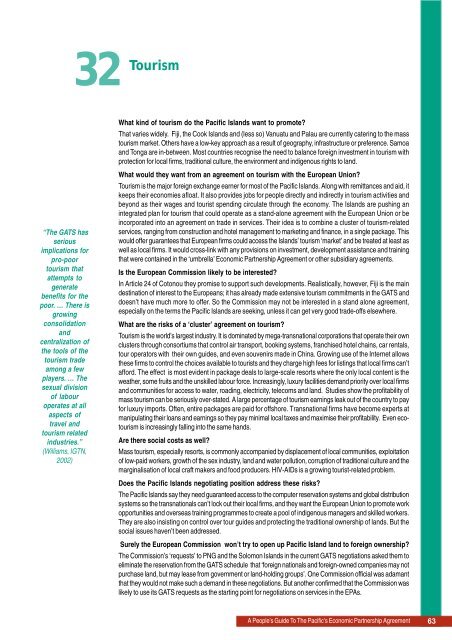REPA Booklet - Stop Epa
REPA Booklet - Stop Epa
REPA Booklet - Stop Epa
You also want an ePaper? Increase the reach of your titles
YUMPU automatically turns print PDFs into web optimized ePapers that Google loves.
32 Tourism<br />
What kind of tourism do the Pacific Islands want to promote?<br />
That varies widely. Fiji, the Cook Islands and (less so) Vanuatu and Palau are currently catering to the mass<br />
tourism market. Others have a low-key approach as a result of geography, infrastructure or preference. Samoa<br />
and Tonga are in-between. Most countries recognise the need to balance foreign investment in tourism with<br />
protection for local firms, traditional culture, the environment and indigenous rights to land.<br />
“The GATS has<br />
serious<br />
implications for<br />
pro-poor<br />
tourism that<br />
attempts to<br />
generate<br />
benefits for the<br />
poor. … There is<br />
growing<br />
consolidation<br />
and<br />
centralization of<br />
the tools of the<br />
tourism trade<br />
among a few<br />
players. … The<br />
sexual division<br />
of labour<br />
operates at all<br />
aspects of<br />
travel and<br />
tourism related<br />
industries.”<br />
(Williams, IGTN,<br />
2002)<br />
What would they want from an agreement on tourism with the European Union?<br />
Tourism is the major foreign exchange earner for most of the Pacific Islands. Along with remittances and aid, it<br />
keeps their economies afloat. It also provides jobs for people directly and indirectly in tourism activities and<br />
beyond as their wages and tourist spending circulate through the economy. The Islands are pushing an<br />
integrated plan for tourism that could operate as a stand-alone agreement with the European Union or be<br />
incorporated into an agreement on trade in services. Their idea is to combine a cluster of tourism-related<br />
services, ranging from construction and hotel management to marketing and finance, in a single package. This<br />
would offer guarantees that European firms could access the Islands’ tourism ‘market’ and be treated at least as<br />
well as local firms. It would cross-link with any provisions on investment, development assistance and training<br />
that were contained in the ‘umbrella’ Economic Partnership Agreement or other subsidiary agreements.<br />
Is the European Commission likely to be interested?<br />
In Article 24 of Cotonou they promise to support such developments. Realistically, however, Fiji is the main<br />
destination of interest to the Europeans; it has already made extensive tourism commitments in the GATS and<br />
doesn’t have much more to offer. So the Commission may not be interested in a stand alone agreement,<br />
especially on the terms the Pacific Islands are seeking, unless it can get very good trade-offs elsewhere.<br />
What are the risks of a ‘cluster’ agreement on tourism?<br />
Tourism is the world’s largest industry. It is dominated by mega-transnational corporations that operate their own<br />
clusters through consortiums that control air transport, booking systems, franchised hotel chains, car rentals,<br />
tour operators with their own guides, and even souvenirs made in China. Growing use of the Internet allows<br />
these firms to control the choices available to tourists and they charge high fees for listings that local firms can’t<br />
afford. The effect is most evident in package deals to large-scale resorts where the only local content is the<br />
weather, some fruits and the unskilled labour force. Increasingly, luxury facilities demand priority over local firms<br />
and communities for access to water, roading, electricity, telecoms and land. Studies show the profitability of<br />
mass tourism can be seriously over-stated. A large percentage of tourism earnings leak out of the country to pay<br />
for luxury imports. Often, entire packages are paid for offshore. Transnational firms have become experts at<br />
manipulating their loans and earnings so they pay minimal local taxes and maximise their profitability. Even ecotourism<br />
is increasingly falling into the same hands.<br />
Are there social costs as well?<br />
Mass tourism, especially resorts, is commonly accompanied by displacement of local communities, exploitation<br />
of low-paid workers, growth of the sex industry, land and water pollution, corruption of traditional culture and the<br />
marginalisation of local craft makers and food producers. HIV-AIDs is a growing tourist-related problem.<br />
Does the Pacific Islands negotiating position address these risks?<br />
The Pacific Islands say they need guaranteed access to the computer reservation systems and global distribution<br />
systems so the transnationals can’t lock out their local firms, and they want the European Union to promote work<br />
opportunities and overseas training programmes to create a pool of indigenous managers and skilled workers.<br />
They are also insisting on control over tour guides and protecting the traditional ownership of lands. But the<br />
social issues haven’t been addressed.<br />
Surely the European Commission won’t try to open up Pacific Island land to foreign ownership?<br />
The Commission’s ‘requests’ to PNG and the Solomon Islands in the current GATS negotiations asked them to<br />
eliminate the reservation from the GATS schedule that ‘foreign nationals and foreign-owned companies may not<br />
purchase land, but may lease from government or land-holding groups’. One Commission official was adamant<br />
that they would not make such a demand in these negotiations. But another confirmed that the Commission was<br />
likely to use its GATS requests as the starting point for negotiations on services in the EPAs.<br />
A People’s Guide To The Pacific’s Economic Partnership Agreement 63
















